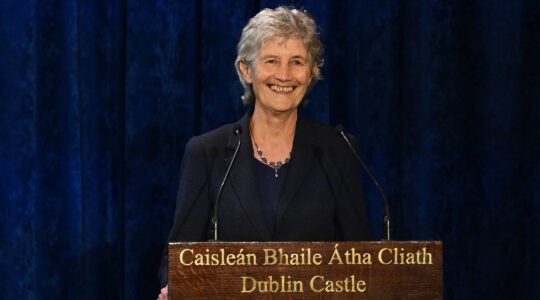AMSTERDAM (JTA) — A well-known rabbi from the Netherlands said he would leave his political party of 20 years to protest its leader’s praise for “Judeo-Christian society” — which the rabbi says excludes Muslims.
Lody van de Kamp, a left-leaning activist for Jewish-Muslim dialog, announced in an interview published Wednesday by Het Parool daily that he was leaving the Christian-Democratic Appeal, or CDA. Earlier that day, the centrist party signed a power-sharing deal with three other coalition partners on the formation of a cabinet, which would work toward having illegal immigrants leave. The agreement in the Netherlands, which is one of Israel’s staunchest supporters in Western Europe, also spoke for the first time in such a document about the need to create an “independent” Palestinian state.
“Suddenly we’re talking about our ‘Judeo-Christian society’,” said van de Kamp, referencing a speech that CDA leader Sybrand Buma last month delivered at a school. “It obscures a hidden thought, that we don’t want the Muslims here, and that makes me uncomfortable,” van de Kamp said.
A leftwing outlier of CDA, van de Kamp angered many Jews and non-Jews in 2015, when he partially dismissed some concerns over growing hatred of Jews in the Netherlands as owing to how “for many Dutch Jews, anti-Semitism has become a hobby,” as he put it.
Buma, who said during the school speech that his party will stand up for “ordinary Dutchmen” suffering from the effects of immigration, has received criticism from his other prominent members of his party following the speech and his insistence on tougher language in the coalition agreement against illegal immigration and criminal phenomena that many associate with Muslim immigrants.
Hirsch Ballin, a former justice minister whose father was a Jewish survivor of the Holocaust, earlier this month penned with another prominent CDA member a letter criticizing Buma, accusing him of “abandoning refugees” and offending Dutch Muslims.
Buma on Wednesday said he was “proud” of the coalition agreement his party co-signed. It marks a rightward shift from the previous agreement, which Dutch Labour in 2012 co-signed with the centrist People’s Party for Freedom and Democracy of Prime Minister Mark Rutte.
Whereas the 2012 document spoke of increasing the number of refugees absorbed in the Netherlands without mentioning illegal immigration, the 2017 agreement states contains no mention of increasing absorption quotas, asserting there will be “countermeasures to irregular immigration” and that “whoever is not allowed to stay must soon leave.” The agreement also contained a reference to anti-Semitism absent from the previous accord and a new assertion that many observes see as connected to radical Islam. “Freedom of opinion is no free pass for inciting hatred and radicalization,” that passage states.
“Our society has no place for hatred of homosexuals, anti-Semitism, hatred of Muslims, genital mutilation, child marriages, forced marriages, incitement of hatred and violence against people for their opinions of against minors,” further states the agreement. In its foreign relations policy, the Netherlands will uphold universal rights “especially of vulnerable groups like LGBT communities and Christians,” the agreement reads.
In addition to Rutte’s party and the CDA — two parties with highly-placed and strong supporters of Israel — the coalition’s other partners are the pro-Zionist Christian Union party and the left-leaning D66 party. In its election for the 2016 elections, D66 said in a statement about Israel that it supports the two-state solution but called on the Dutch government to recognize a Palestinian state regardless of an agreement.
It also said the Netherlands should “apply measures against Israel’s settlement policy” in the statement, which did not include a suggestion of similar measures against Palestinian actions deemed detrimental to peace.
As in the 2012 agreement, the Palestinian-Israeli issue was the only international conflict named in the 2017 document. Israel was first mentioned in the coalition agreement in 2007, in a paragraph that spoke also of a peace process for the creation of a “sustainable” Palestinian state.
But unlike the earlier accord, which spoke merely of contributing to peace and security while maintaining good relations with both parties, the agreement unveiled this week speaks of support for Palestinian statehood under the two-state solution for an “ independent, democratic and viable Palestinian state alongside a secure and internationally-recognized Israel.”
JTA has documented Jewish history in real-time for over a century. Keep our journalism strong by joining us in supporting independent, award-winning reporting.





